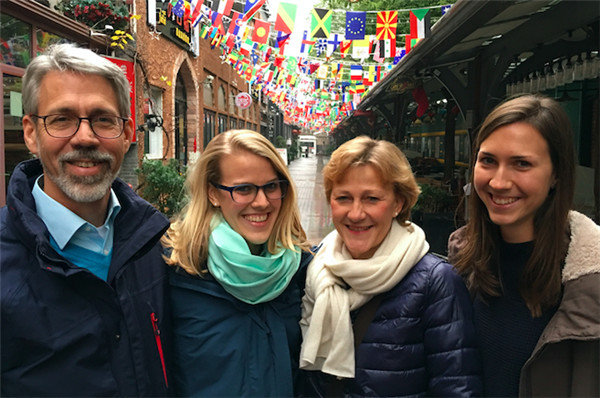
2018-10-12 08:36:41
From:english.eastday.com
Wu Qiong
Intercultural Communication professor grateful to help shape China’s burgeoning IC discipline
The international atmosphere here was another reason why he and his family chose Shanghai. Coming in 1993 with two young children, an environment with good hospitals, educational options, and some German-speaking families for language and cultural support were attractive. Many German companies had joint ventures in Shanghai, like Volkswagen, Siemens, Henkel, and with an active German consulate, there was hope of possible German school support as the children grew, which indeed happened. After attending Chinese kindergarten and 3 years of Chinese primary school, both girls graduated from the German School Shanghai and his wife served on the school board and as a consulting doctor for the consulate.

(Steve and his family. Photo provided by Steve J. Kulich)
With a master’s degree in intercultural communication, Steve started to teach at SISU’s Overseas Training Center in 1993, primarily providing training for scholars preparing to study abroad and employees upgrading their competencies for State-owned Enterprises and multinational enterprises. It was there that he started intercultural communication orientation courses in 1994 and also sought contact with Chinese scholars pioneering the intercultural communication field here.
When he had previously undertaken a survey of China’s understanding of intercultural communication for his master’s thesis, he could find only five books, none of which were particularly deep. However, the academic field, which grew out of comparative studies in anthropology, psychology, education and communication, had formalized in the US by 1970. By the time Steve finished his MA in 1992 IC was mature and also expanding in Japan, Germany, France and other countries. However, when it came to East-West cultural comparisons, many people reverted to Japanese and American comparisons. For various reasons, the world’s understanding of China, and China’s of the world, were lagging behind. But by the late 1980s, Chinese teachers were focusing more on language and culture teaching, and similar to Steve at SISU, intercultural communication courses were opened in Beijing Foreign Studies University (BFSU), Harbin Institute of Technology (HIT), Beijing University, Fujian Normal University, and other Chinese universities. It was a great time to come, contribute, and collaborate!
